- Home
- Martin Cruz Smith
December 6 (V5.0) Page 6
December 6 (V5.0) Read online
Page 6
Taro tipped forward and became solemn. “Harry, remember Jiro?”
“Your brother? How could I forget?” Taro and Jiro were huge twins told apart by their names, meaning “firstborn” and “second.”
“He made your life miserable.”
“Not all the time,” Harry said. “We had some fun.”
“Picking pockets?”
“Yeah. Jiro was large like you. He did the bumping and I did the dipping.”
“He always had money when he was with you.” Taro fell silent, then said, “Jiro only helped pick pockets because the boat came to me. I was the older twin. If he’d been first, he would have been Taro and I would have been Jiro. That makes you think.” He squinted into the firebox. “You know what they say about twins. The parents must have been… you know… too much.”
True, Harry thought. Let a couple have twins and the neighborhood acted as if the parents were randy as dogs.
“Everyone sniggered except you, Harry. Everyone. That’s why he went bad, I’m convinced.”
“He was a little rough around the edges.”
“The police gave him a choice, the army or jail.”
“He always wanted to fight. He got his chance.”
“Harry, can I ask you for a favor?”
“It depends.”
“That’s always your answer, isn’t it?”
“It depends.”
Taro felt in his sleeve and came up with a telegram. He smoothed it out against his chest and gave it to Harry, who read it by the light of the fire. The telegram offered congratulations from the army and informed the recipient when the remains of Lance Corporal Kaga Jiro would arrive at Tokyo Station.
“Christ. It’s this afternoon.”
“It’s the first we heard that he was even hurt.”
“That’s tough, okay.”
“Go with me, Harry?”
“I can’t go with you. I’m not family.”
“Mother is too weak, it would kill her to go. I just can’t face Jiro alone.”
“A gaijin picking up Jiro? How is that going to look?”
Taro put the cup aside, swept the deck with a paw and knelt until he’d reached a deep kowtow. No one had ever given Harry a kowtow before, least of all a sumo. The circles Harry ran in, he’d hardly ever seen one kowtow, and now two big bows in a morning, how strange was that? Not to mention the pistol in his car.
“Get up,” Harry said.
From his facedown position, Taro’s whisper was muffled. “At least meet me afterward, Harry. I can’t face him alone, not yet.”
“No. Now get up.” Harry tugged at Taro’s sleeve.
Taro was deadweight. “Harry, please.”
“It’s a bad idea. You’re going to lie there all day?”
“Harry…”
Jesus Christ, Harry thought. The stupid brothers had hated each other from the day they were born, fifteen minutes apart, as Taro said.
“Shit,” Harry said in English. “That means yes.”
“Thank you, Harry.” Taro sat up, instantly relieved, and refilled Harry’s cup. “Thank you, Harry, much better.”
“At the ballroom.”
“The ballroom.”
They drank and admired the lightening sky. A boat slipped by, a shadow at the stern working the single oar. Harry, looking for small talk, said, “Let’s hope there won’t be many more heroes after Jiro. Who knows, maybe Japan will pull out of China.”
Taro asked, “Do you know how to catch an octopus? It’s the only interesting thing I learned from fishing.”
“You know, I’ve never tried.”
“You trick him. An octopus is so smart and shy, and he spends all his time in his cave. Hooks don’t work. Nets catch on the rocks. But the octopus is greedy, and he loves the color red. You tie a red rag around a pole and wave that rag down in the water, right outside the octopus’s cave, and he can’t resist. Out comes one tentacle at a time until he’s completely wrapped around that pole. You just lift him out, because he wants his red rag, and at the cost of his own life, he won’t let go. That’s Japan with China. We won’t let go.”
SATURDAY WAS A WORKDAY. Traffic drove on the left side of the street, mainly taxis and trams, some rickshaws running doctors to the hospital around a stationary line of army trucks, four-by-two Toyotas that were really Chevrolets in disguise. Harry’s own car was a low-slung Datsun built at Ford’s old plant in Yokohama. Ford and GM had both had what were called “screwdriver assembly plants” until the Japanese learned enough about mass production and booted them out. Few private cars were on the road, and most of them were powered by a charcoal furnace attached to the back in a system that was ingenious but virtually powerless; uphill, passengers pushed. Harry ran on black-market gas. He figured the day he drove a car powered by charcoal was the day he cashed in his chips.
On the passenger seat was the pistol. On the car radio, Japan Broadcasting offered its usual morning fare, an exercise program of jumping jacks. “One, two! One, two! One, two!” Workmen were hanging loudspeakers from lampposts so that the general population could benefit from the same instructions. “One, two! One, two!” Tokyo was on the move.
In fits and starts. Harry had given himself an hour to get to the Chrysanthemum Club, but convoys of army trucks brought all other traffic to a halt until police rerouted everyone miles around the far side of the palace. A rag-wagon horse expired outside the Diet building, then a bike transporting a six-foot stack of noodle trays went down in front of Harry’s car, and by the time he reached even the center of the city, he was forty minutes late. Usually he was entertained by Tokyo Station, the mixed bag of commuters in three-piece suits and farmers in cone-shaped hats of straw. He always enjoyed the secretly triumphant way salesgirls and switchboard operators twitched to work in their long tight skirts and little French hats. Today, however, everyone just seemed in Harry’s way. Yet he discovered that, at a certain level, he didn’t give a damn. Here he was at the acme of his business career, invited to dine with the Rockefellers and Carnegies of Japan, while Ishigami tracked him down like a crazed assassin. Not to mention Michiko’s suspicions. He needed a ship, he needed a train, he needed a plane and here he was riding the eight ball. And part of him couldn’t care less. It was the part that he didn’t see often. Occasionally it looked out of the mirror and asked, What’s the point of this game?
Behind the domes of Tokyo Station rose an eight-story imitation of Wall Street, a row of gray financial temples, the great banks of Japan. They stood side by side, the Ionic columns of Mitsubishi, Corinthian columns of Mitsui, tomblike doors of Sumitomo, all leading to the marble stairs and double brass doors of the Chrysanthemum Club with their famous crest of a Fuji mum within a ring. Harry tucked the Datsun behind a row of uniformed chauffeurs in Cadillacs and Packards. He might be almost an hour late, but he took the stairs one at a time, aware of the study he was receiving from bodyguards grouped on the stairs. They were retired detectives and off-duty police, chewing toothpicks or smoking cigarettes. Although the rate of political assassination had slowed, the army had made it clear it would eliminate anyone it suspected of less than white-hot patriotism, and if the atmosphere in Asakusa was frivolous, the air around the palace seemed weighted with dread and expectation. It had taken nothing less than the threat of war for the club to open its doors to Harry Niles, but once in, he found himself guided by a sort of butler dressed like a royal chamberlain. At the sixth floor, Harry was directed from the elevator to a door that was ajar to the sound of murmuring. Too late, he regretted the sake with Taro.
The worst thing was to look like a schoolboy late for class. Harry forced himself to slowly enter a dining room of a few hundred diners who fell silent at the sight of him. Palpable opprobrium and curiosity took aim, but Harry made a ninety-degree bow of apology and moved toward a head table where a conspicuously empty chair awaited him. Only when he had seated himself, made more apologies and drawn himself up to the table did he dare take in the room itself, it
s panels of precious woods, black persimmon and pale Yaku cedar, the blaze of chandeliers, the ornamental fires in the fireplaces at each end. The Chrysanthemum Club was the club of international trade, and it was, to some degree, an imitation of a London gentlemen’s club, yet unmistakably Japanese. Chrysanthemums stood in crystal vases, staff in swallow-tailed suits shuffled softly around with coffee and green tea, always bowing when they passed a larger than life-size oil portrait of the club’s royal sponsor, the emperor himself, a stooped, scholarly man regarding a globe with great intensity.
The diners had fallen on the last of their kippers and eggs. There were close to three hundred guests, Harry thought, not a bad muster considering how many foreigners had fled Tokyo. The Americans were an embassy attaché, a couple of Rotarians, a pair of forlorn managers from Standard Oil of New York and National City Bank, and Al DeGeorge, who never missed a free meal. The British side was led by First Secretary Arnold Beechum, a beefy sportsman with small eyes stuck on a dome of freckles. A blockade-runner must have come in, because the Germans were well represented. Naval officers in roguishly handsome sweaters and dress blues shared a table with beaming executives from Siemens and I. G. Farben who were already anticipating a vigorous postwar economy. Willie Staub had been seated at a second table with Ambassador Ott, who had looked sick since the recent arrest of his best friend as a Russian spy, and Meisinger, a Gestapo colonel with thinning hair and greasy jowls. Meisinger’s nickname was “The Butcher of Warsaw.” Willie appeared distressed, though how anyone could be unhappy schmoozing with the Butcher of Warsaw, Harry couldn’t imagine. Sharing a table, the Italians and Vichy French appeared locked in mutual Mediterranean contempt. Other Europeans and tame Chinese were scattered around the room, but most of Harry’s audience consisted of Japanese executives sweaty around the collar because they were misunderstood. Misunderstood at home by an army just as happy to gun down capitalists as Communists and misunderstood abroad by their former friends and trading partners. Hence the breakfast address by Harry Niles.
Harry felt like a burglar allowed to work with the lights on. He didn’t mind missing the eggs and toast; he preferred the unsullied chrysanthemum motif of the plate, the same design woven into the linen, engraved on water glasses, etched in silverware. His breakfast buddies at the head table were directors from IHI Engineering and NYK Shipping, the president of Nippon Air, an elderly chairman from the Yasuda Bank, all stiff as a row of bamboo sticks. On Harry’s left was the last empty chair, on his right a young vice president from Yoshitaki Lines so scared of Harry that he spilled his coffee. Members rose to make announcements; the club’s language was English as a nod to its international bent. Someone from the back of the room reported with regret the cancelation of a joint lunch with the American Club.
Harry was fine until the last chair was taken by a small man whose elegant pin-striped suit was contradicted by his cropped white hair, dark face and thick hands toughened with brine. It was Yoshitaki himself. Mitsubishi and Sumitomo had begun as samurai. Starting as a poor seaman, Yoshitaki had opened the Pacific for Japan shipping fifty years before by re-outfitting side-wheelers sold for scrap and facing down Chinese pirates and British gunboats. Now he was one of the wealthiest men in Japan and one of the best informed. If he didn’t know exactly where the Combined Fleet was, he certainly knew in what direction it sailed. He had eyes that seemed set on a far horizon or deep into another man’s soul, and he offered an expression of contempt so polite that Harry felt like a rotting fish.
Yoshitaki asked his vice president, “Do you observe the wall panels?”
“The wood is beautiful.”
“Without imperfection. Such trees must be pruned for two hundred years or more,” Yoshitaki said. “They must be diligently pruned and cleansed of alien infection. Allowing an alien infestation, a canker or a worm, is the greatest mistake a forester can make.”
Fuck you, too, Harry thought. As he reached for the water, he noticed the two directors abruptly sit up, their eyes wide. On Harry’s jacket sleeve was a large black beetle. Harry felt in his pocket and found a perforated cardboard box, wood shavings and string. The tailor’s son had slipped him a beetle. That was why the boy had said, “For you.”
It was a jet-black rhinoceros beetle with a sweeping upcurved horn. The beetle stepped from the sleeve to the table, shuffled its wing covers and started climbing a starched white napkin. One by one, the other guests at the head table focused on its progress, on Harry, back on the beetle. There weren’t many places in the world, he thought, where dropping big insects on the table was socially acceptable, and the Chrysanthemum Club probably wasn’t one of them. He felt Yoshitaki’s amusement in particular.
The beetle was a robust Minotaur, with no ill effects from the fire that Harry could see. While another report from the back of the room droned on, the beast conquered the napkin and went from guest to guest examining the silverware, chinning itself on the plates as the diners drew back. Finally, as if confused by freedom, the beetle wandered back within reach of Harry, who scooped up the insect gently, let it have a little exercise from hand to hand, placed it in the box with shavings and tied the box shut tight.
“Do you have any more surprises?” Yoshitaki asked.
“I hope not.”
“What a disappointment.”
Harry became aware that he was being introduced. The “well-known Western businessman, keen observer of the international scene and longtime friend of Japan,” that was him. He stood to a round of spotty applause. “Like raising Lazarus,” his father used to say about a stiff congregation. But the old man could do it, and if his father was good with a sermon, Harry had perfected the anti-sermon. He put Michiko and Ishigami out of his mind. He walked around the table, made eye contact with Beechum, DeGeorge, Ott, a Mitsui director here, a Datsun manager there, and let the moment draw until the last cough was extinguished.
When Harry had complete silence, he began. “Americans ask me, What does Japan want? Does Japan seek to rule the Asian mainland? Does Japan have a dream of world domination? The answer is of course not. On the other hand, Japan has real needs and real aims. What Japan wants is peace in a world of stability and prosperity. A world divided into three economic spheres with three natural leaders, Germany in Europe, America in the Western Hemisphere and Japan in Asia. The old order is falling. Like any collapsing building, the faster its ruins are swept up and carted away, the safer and better for everyone. The day when the white man ruled in Asia is over. Dying empires must give way to vigorous new ones.”
Harry detected a satisfied Japanese intake of breath, a susurrous pleasure that filled the room. Admittedly, in normal times the association was addressed by Nobel Prize academics, visiting business magnates or international publishers from Fortune or Time, not a moving picture rep . These were not normal times, however. The clever part of having someone like Harry talk was that he could say all those things that no well-brought-up Japanese would say to a Westerner. Harry could be disowned or discredited, but he’d say what he knew the Japanese wished they could.
“Japan has been patient. In the Great War, Japan was the staunch ally of Great Britain and the United States and secured the Pacific for its friends. For which service, all Japan asked was respect. Did Japan receive it? No. Instead, Britain and America did their best to lock the Japanese navy into an inferior status. Britain ended its friendship treaty with Japan, and the United States enacted racist immigration laws meant to insult the Japanese people. Japan had offered its hand in goodwill. In return it was slapped in the face.”
Harry picked out guests he recognized.
“Slapped.” He looked toward Beechum. “Japan has never understood this lack of sympathy from England. The Japanese ask, Why was it proper for one island nation to fatten on the lifeblood of peoples around the world and not proper for another nation to help its close neighbors develop a modern economy? Why is it a Christian duty for England to enslave Africa, India, Burma and Malaysia and not right for Jap
an to lead the peoples of Asia toward prosperity and independence? Take Hong Kong, for example. The truth is that England has no more legal claim on Hong Kong than Japan has on Scotland or Wales. It has no right, only might, which is why England boasts about the naval guns it has placed in Singapore. England claims to be keeping the peace, when in fact it is ruling the roost with eighteen-inch guns. Or desperately trying to.” The British table traded dark glances. Well, this was probably one of the few speeches in Japan they understood, Harry thought; the British community in Tokyo was famous for its ignorance of Japanese.
By then Harry had moved briskly on to Roy Hooper, the American attaché, a man with all the misplaced faith and optimism of a missionary. “Japan also asks its American friends, Why is a ‘Monroe Doctrine’ reason enough for you to declare an entire hemisphere your own private concern? What gives you the right to rush marines into Mexico or Cuba or the Panama Canal? Who gave you the right to seize Hawaii, thousands of miles away from the American mainland? How is it you can claim the right for all these invasions, but let Japan respond to provocations from a neighbor or help the people of Manchukuo liberate themselves from centuries of ignorance and exploitation and Japan is pilloried for so-called aggression and driven from the League of Nations? Why? Because there is one law for white men and another law for Japanese.”
Delivering this sort of speech was like grilling steak, Harry thought. You did one side, then the other. The main thing was to keep the coals hot.
“Nowhere is this lack of honesty or fairness more clear than in China. England says it is only protecting the rights of the Chinese. Is that so? Is this the same China that England conquered with repeating rifles, the same Chinese it slaughtered in Peking? The China that Britain enslaved to opium? The China that all of Europe carved up into colonies? The China of a very few rich and hundreds of millions wearing rags and surviving on scraps from the European table?” When Beechum’s pinkness darkened to red, Harry returned to Hooper. “Then there are the protests from America. America is different, America doesn’t want an empire, it only wants markets. America claims no properties in China, all it wants is free trade, an Open Door for export and import, a level playing field for innocent commercial interests. Which means different things in different places. In China it means that the banks of New York can buy Chinese war bonds and subsidize year after year of conflict and misery. In China it means a market for the cotton mills of South Carolina and Alabama. But in the United States it means a closed market to Japanese cotton, not to mention Japanese silk. Again, one law for the white man, another law for the Japanese.”

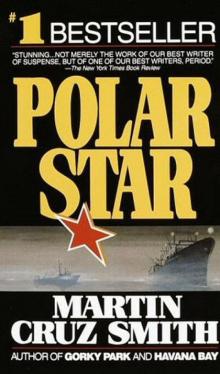 Polar Star
Polar Star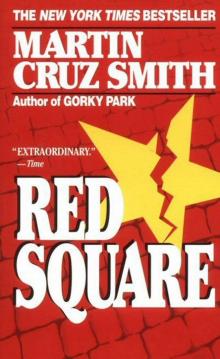 Red Square
Red Square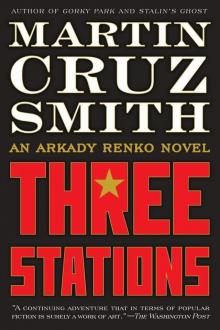 Three Stations
Three Stations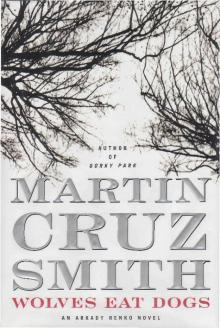 Wolves Eat Dogs
Wolves Eat Dogs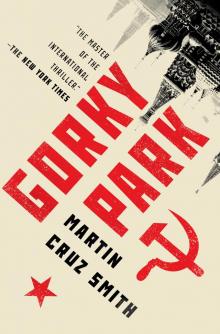 Gorky Park
Gorky Park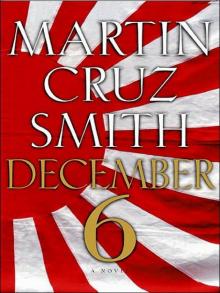 December 6
December 6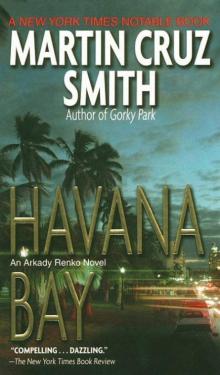 Havana Bay
Havana Bay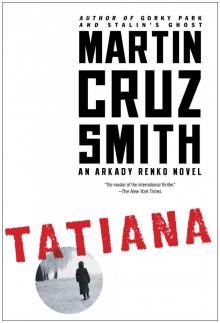 Tatiana
Tatiana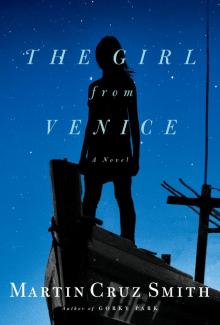 The Girl From Venice
The Girl From Venice Stalin's Ghost
Stalin's Ghost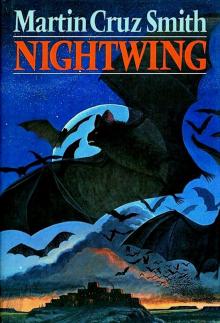 Nightwing
Nightwing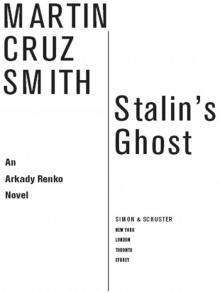 Stalin s Ghost
Stalin s Ghost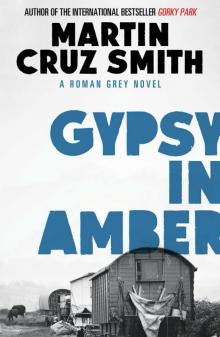 Gypsy in Amber
Gypsy in Amber Rose
Rose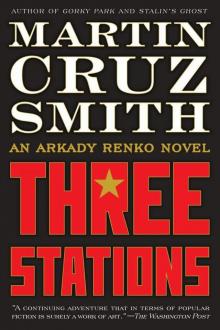 Three Stations: An Arkady Renko Novel
Three Stations: An Arkady Renko Novel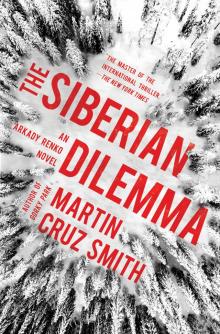 The Siberian Dilemma
The Siberian Dilemma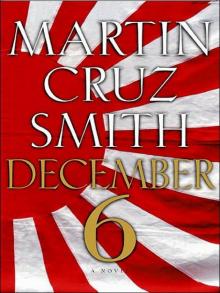 December 6 (V5.0)
December 6 (V5.0)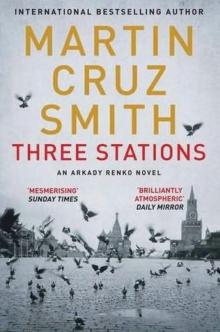 Three Stations ar-7
Three Stations ar-7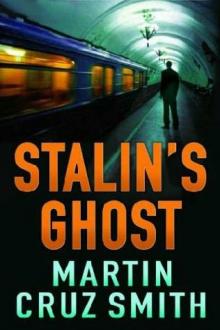 Stalin’s Ghost ar-6
Stalin’s Ghost ar-6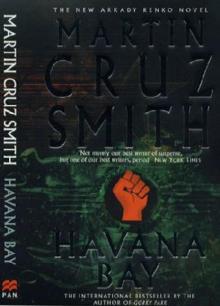 Havana Bay ar-4
Havana Bay ar-4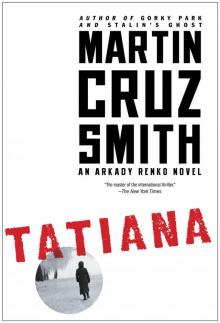 Tatiana ar-8
Tatiana ar-8